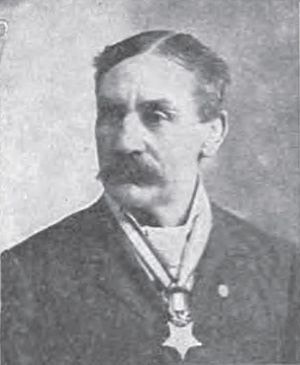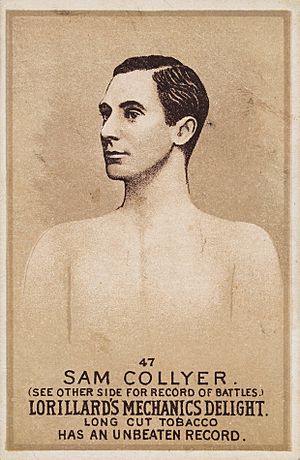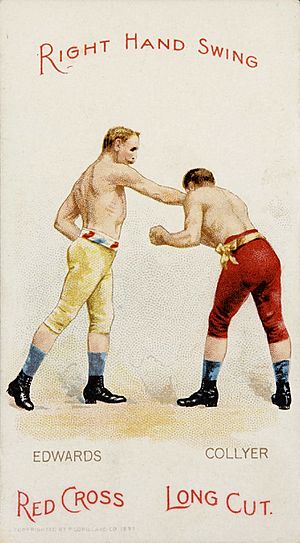Sam Collyer facts for kids
Quick facts for kids
Sam Collyer
|
|
|---|---|

Walter Jamieson wearing his Medal of Honor
|
|
| Birth name | Walter Jamieson |
| Born | May 14, 1842 Boulogne, France |
| Died | December 7, 1904 Brooklyn, New York |
| Allegiance | United States of America Union |
| Service/ |
Union Army |
| Years of service | 1861 - 1865 |
| Rank | Lieutenant |
| Unit | The 28th Regiment, New York State Militia; 139th New York Volunteer Infantry Regiment |
| Battles/wars | American Civil War |
| Awards | Medal of Honor |
Sam Collyer (born Walter Jamieson) was a famous bare-knuckle boxer. He was the American Lightweight Champion. He was born in Boulogne, France, on May 14, 1842. He passed away in Brooklyn, New York, on December 7, 1904.
Sam Collyer was not a very big man for a boxer. He weighed between 115 and 125 pounds. He stood about 5 feet 5 and a half inches tall. He moved to the United States as a young boy. In 1898, he received the United States Medal of Honor. This award was for brave actions he took in 1864 during the American Civil War.
Contents
Sam Collyer's Early Life
Sam Collyer was born in France as Walter Jamieson. He came to the United States when he was a boy. In September 1862, he joined the Army from Brooklyn. He earned the Medal of Honor for his actions during the Siege of Petersburg. He left the army in June 1865 with the rank of Lieutenant.
Sam Collyer's Boxing Career
Sam Collyer's first boxing matches are a bit unclear. Different records show different dates and opponents. But it is known that he fought and beat a man named Mike Carr in early 1866. His first big fight was against Horatio "Race" Bolster. They met in Alexandria, VA, on May 8, 1866.
During this fight, Bolster broke his hand and took a lot of hits. The match ended after 49 rounds and 55 minutes. Collyer won when he knocked Bolster down, and Bolster's team gave up.
Becoming the American Lightweight Champion in 1866
Later in 1866, Collyer fought former champion Young Barney Aaron. They were fighting for the American Lightweight Championship. The title had been empty since 1863. The fight between Aaron and Collyer happened on June 20, 1866. It took place at Pohick Landing, VA.
This tough battle lasted 47 rounds and 2 hours and 14 minutes. Collyer was finally declared the winner. The New York Herald newspaper described the end of the fight:
Rounds 41 to 44 were very similar. Barney kept falling to his knees. In Round 47, he could not see. His team saw there was no way to win and did not want him to get hurt more. So, they threw in the towel, meaning they gave up.
On September 7, 1866, Collyer defended his title against Johnny Lafferty. That fight lasted 39 rounds and 62 minutes. His next defense was against Johnny McGlade. This fight was in Goldsboro, PA, on January 15, 1867. McGlade had been sick before the fight. Collyer easily won. They fought for 47 rounds and 55 minutes in a ring covered in sleet. McGlade's team eventually gave up.
Losing and Winning Back the Championship in 1867
Collyer lost his title in a rematch with Young Barney Aaron on June 13, 1867. They had a very hard fight that lasted 68 rounds. It took 1 hour and 55 minutes. The match was held at Aquia Creek in Northern Virginia. About 1500 people watched.
Young Barney won the choice of where to stand in the ring. He wisely chose the side not facing the sun. By the end of the fight, Collyer's eyes were swollen shut. His team had to throw in the sponge. This meant they gave up. Bare-knuckle boxing was very tough and brutal. Both boxers were knocked down many times.
After winning the title, Young Barney Aaron took a break from boxing. This left the championship open for Collyer to win back. His fights with Collyer were some of his most famous.
The first person to challenge Collyer for the title was Billy Kelly. Kelly was a very skilled boxer. News of their fight spread quickly. The Collyer/Kelly match happened on November 27, 1867. It was in Strickland, PA. Collyer attacked from the start. Kelly had to play defense for almost the whole fight. They fought 111 short rounds and for 1 hour and 50 minutes. Finally, Collyer knocked Kelly down for the last time.
The New York Herald newspaper described the end of this fight:
Round 109—Collyer wanted to end the fight before dark. He rushed at Kelly and hit him hard. Kelly went down.
Round 110—Collyer hit Kelly's nose with his left hand. Then he hit him twice with his right hand. He then grabbed Kelly and threw him down hard.
Round 111 and Last—Collyer rushed at Kelly and hit him hard in the mouth, knocking him down.
Kelly's team threw in the sponge, meaning they gave up. Sam Collyer was the winner! Kelly was very sad and cried. Collyer went to him and hugged him, and also cried. Then Collyer walked around the crowd and collected money for Kelly. He did this for the man he had just beaten fairly for the lightweight championship of America.
Rivalry with Billy Edwards
On August 24, 1868, Collyer lost his American Lightweight Title to Billy Edwards. This fight lasted 47 rounds. Their second fight was on March 2, 1870. It was on Mystic Island, CT, near Long Island, NY. The American Lightweight Title was on the line again. This time, Collyer's team gave up in the 40th round.
Edwards agreed to a third fight with Collyer in July 1870. Collyer sent the last payment for the fight money by a messenger. But the money did not reach the person holding it in time. Because of this, Collyer lost the match by default to Edwards. Collyer said he sent the payment on time and it was the messenger's fault. He tried to get his money back. This hurt his reputation as a boxer.
The rivalry between Collyer and Edwards continued outside the boxing ring. In March 1871, Collyer challenged Edwards to a fight right there in Harry Hill's Saloon in New York. Things got heated, and Edwards pulled out a pistol. Collyer reacted by punching Edwards. The fight got bigger, and Collyer took more of the beating.
Their third and final boxing match happened on August 8, 1874. It was in Mill Creek, WV. In the 10th round, Collyer landed a strong uppercut. It knocked Edwards onto his back. In the 11th round, Edwards seemed tired and was slow to get ready. As he did, Collyer's team noticed something in Edwards' hands. The referee told him to open his hands.
Five days later, on August 13, 1874, the referee Charles Carroll announced his decision. He said Edwards was the winner. This was an unsatisfying end to Collyer and Edwards' six-year rivalry.
A Difficult Time and Prison
Sam Collyer was the trainer for a boxer named Billy Walker. He was also in Walker's corner during a fight against Jimmy Weedon. This fight happened on August 31, 1876, in Pennsville, NJ. In the 76th round, Weedon knocked out Walker. Walker did not get back up. Collyer threw in the sponge to end the fight. Sadly, Walker passed away later that night from his injuries.
Because of this, Collyer, Weedon, and others involved in the fight were arrested. They were found responsible and sentenced to prison. Collyer was sentenced to six years. Weedon passed away a year later in prison. Collyer was pardoned and released two years later.
Later Boxing Career
After being released from prison, Collyer continued to fight in smaller matches. In 1888, Collyer heard that the current Lightweight Champion, Jack McAuliffe, said he could knock out the older Collyer in two rounds. Collyer was 46 years old, and McAuliffe was 22. Collyer then challenged McAuliffe to a gloved fight of six rounds.
The fight took place on December 16, 1888, in New York City. Collyer lost in two rounds, which took three minutes. After this, the Governor of New Jersey, General George B. McClellan, who was Collyer's former Civil War commander, called for Collyer. He made Collyer promise to never box professionally again.
Sam Collyer's Later Life
After he retired from boxing, Collyer started working as a machinist. He worked at the Brooklyn Navy Yard. He stayed there until he passed away on December 7, 1904. During his life, he also raised the teenage sons of his late brother, Henry Jamieson. He even performed with the boys in the famous Barnum and Bailey show.
Sam Collyer's Legacy
Sam Collyer was honored for his boxing career. He was elected into the Boxing Hall of Fame in 1964.
Partial List of Fights
| Date | Result | Opponent | Round | Time | Purse | Location | Notes |
|---|---|---|---|---|---|---|---|
| Mar 16, 1866 | Won | Mike Carr | 14 | 24 minutes | $200 | near Rock Creek, MD | First known professional fight |
| Apr, 1866 | Jim Kerrigan | ** | ** | $1000 | not chosen | Kerrigan side forfeits after financial backers back out | |
| May 7, 1866 | Won | Horatio "Race" Bolster | 49 | 55 minutes | $600 | near White House, VA | Fight was spur of the moment |
| Jun 20, 1866 | Won | "Young" Barney Aaron | 47 | 2 hours, 5 minutes | $2000 | near Pohick, VA | American Lightweight Title fight; both fighters carried off on stretches, and arrested by police. |
| Jan 15, 1867 | Won | Johnny McGlade | 47 | 55 minutes | $2000 | near Goldsboro, PA | American Lightweight Title fight |
| Jun 13, 1867 | Lost | "Young" Barney Aaron | 68 | 1 hour, 55 minutes | $1000 | near Aquia Creek, VA | American Lightweight Title fight; Barney Aaron retires soon after passing the Title back to Collyer |
| Nov 27, 1867 | Won | Billy Kelly | 111 | 1 hour, 50 minutes | $2000 | near Strickland, PA | American Lightweight Title fight |
| Aug 24, 1868 | Lost | Billy Edwards | 47 | 1 hour, 14 minutes | $2000 | Traverse Island, Coan River, VA | American Lightweight Title fight |
| Oct 5, 1869 | Charley Doherty | ** | ** | $2000 | Jamestown Island, Smith River, VA | American Lightweight Title fight; Doherty overweight on weigh-in, forfeits to Collyer | |
| Mar 2, 1870 | Lost | Billy Edwards | 40 | 47 minutes | $2000 | Mystic Island, CT | American Lightweight Title fight |
| Jul 19, 1870 | Won | Johnny Lafferty | 21 | 14 minutes | $600 | 3 miles south of Quindaro, MO | |
| Sep 27, 1870 | Billy Edwards | ** | ** | $1600 | within 50 miles of St. Louis, MO | American Lightweight Title fight; Collyer's side forfeits because final deposit not received in time from courier. Edwards keeps Title. Collyer sues to get money back. | |
| Nov 23, 1872 | Won | Patsy McGuire | 7 | 20 minutes | $400 | 2 miles from Little Rock, AR | Foul by McGuire; Collyer declared winner |
| Aug 8, 1874 | Lost | Billy Edwards | 11 | 24 minutes | $2000 | Mill Creek, WV | Collyer's side claimed foul, refused to keep fighting. Referee declares Edwards winner. |
See also
- List of Medal of Honor recipients
- List of Bare-knuckle Lightweight Champions
- List of bare-knuckle boxers
 | Emma Amos |
 | Edward Mitchell Bannister |
 | Larry D. Alexander |
 | Ernie Barnes |



